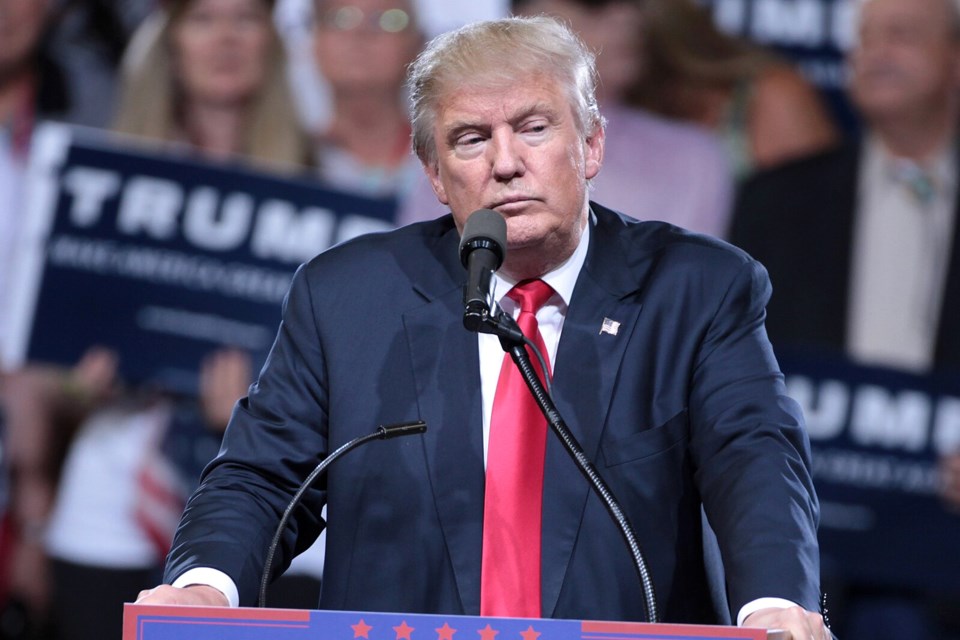Late night results Nov. 5 showed U.S. Republican candidate Donald Trump poised to regain his country's presidency, leaving many B.C. business leaders and political watchers concerned about how his ascendancy will impact Canada.
Fox News projected Trump to be the winner at about 10:45 p.m. Vancouver time. Other U.S. networks have yet to make that call. Many U.S. citizens' votes have yet to be counted and many states' results are yet uncertain.
Fox News' latest count had Trump at 277 electoral college votes, versus 226 for Kamala Harris. That leaves 35 electoral college votes to be determined. Candidates need 270 electoral college votes to win the presidency.
Former B.C. Premier Christy Clark told BIV this evening that her main concern with a Trump victory is the potential impact it poses on what is known in Canada as the Canada-United States-Mexico Agreement (CUSMA).
"This outcome, what it will have on our free-trade agreement, will be the salient outcome for Canadians," Clark said.
Canada, the U.S. and Mexico must by July 1, 2026, confirm in writing that they want to continue the agreement. If any of the countries decide not to renew the agreement, the pact’s future will be in danger.
Failing to renew the agreement would potentially mean a wide range of new protectionist measures and tariffs.
In addition to tariffs triggered by the end of the trade agreement, Trump has scared many in the business community on both sides of the border with declarations to impose 60-per-cent tariffs on goods imported from China and at least 10-per-cent tariffs on all other countries.
Sometimes his calls have been for 20-per-cent tariffs on imported goods from countries other than China.
Real estate marketer and Rennie principal Bob Rennie told BIV tonight that U.S. tariffs on Canadian goods were his main concern.
"Renegotiating tariffs is inflationary for Americans," he said. "The limiting of immigration and kicking out of illegal immigrants is inflationary. We will be reacting to that."
Rennie then looked at the stocks app on his iPhone and showed BIV a chart showing that the Canadian dollar had dropped by at least one cent versus the U.S. greenback in the previous two hours.
Rennie was the host of a gathering tonight at The Sportsbar at Rogers Arena where many business leaders and politicians gathered. He told BIV that the intent of the gathering was to stimulate conversations by people across the political spectrum.
"My goal has always been to get diversity in the room," he said. "We're all getting along talking with each other so I'm so happy."
His concern about the Trump tariffs' effect on trade is not new.
TD Bank economist Marc Ercolao, for example, wrote an Oct. 24 note that suggested that a new 10-per-cent U.S. tariff on Canadian imports, and a retaliatory 10-per-cent tariff on U.S. exports to Canada, could reduce Canadian exports by nearly five per cent by early 2027.
"As the output gap widens, the Bank of Canada may be forced into additional interest rate easing to the tune 50–75 basis points, widening the spread to U.S. rates and putting downward pressure on the Canadian dollar," Ercolao said.
The spectre of a Trump win will likely spur plenty of calls from Harris supporters that they will want to leave the country.
Much talk arose in 2016, among Democrats, who said that they would move to Canada if Trump won. Folk singer David Crosby, for example, joked in a concert in Vancouver a couple months before that election that the event was a ruse for him scouting Vancouver real estate.
Immigration websites to Canada have crashed in hours following past election outcomes.
"You definitely see spikes in interest," Irene Bloemraad, a professor and co-director of UBC’s Centre for Migration Studies, told BIV this evening.
"The number of people who actually acted on that was very small."
Greater Vancouver Board of Trade CEO Bridgitte Anderson tonight told BIV she was concerned about the province's economy.
"We need to be focused on economic growth and stable supply chains," she said. "When you look at what's happening at the port [where there is a lockout] at Canada Post [where there is a potential strike] we need to be focused on trade and investment. If we don't, we are such a small trading partner in the global realm, we are going to be left further and further behind at a time where we're already seeing stagnating growth and rising costs."
Earlier today, BIV reported that BC Lottery Corp's PlayNow website had odds that showed that B.C. bettors expected Trump to win.



